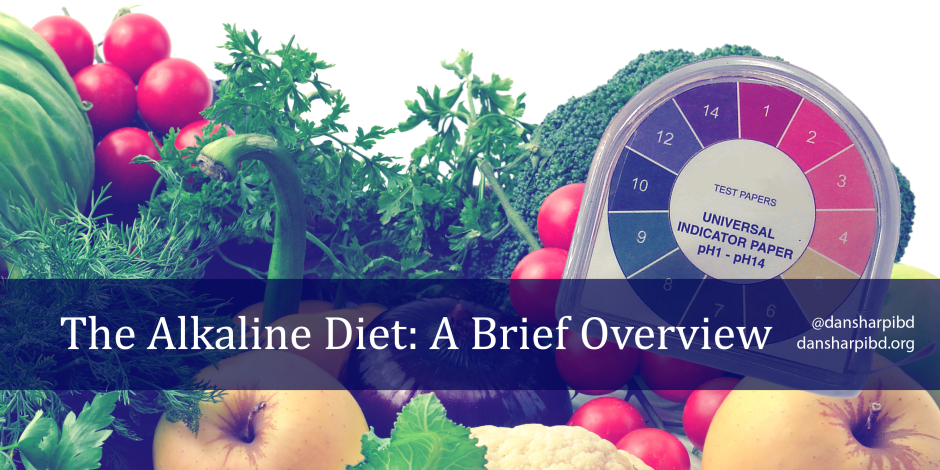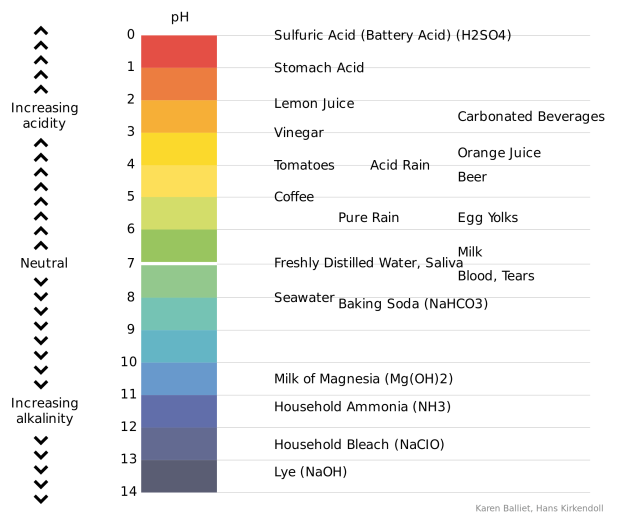Many Inflammatory Bowel Disease (IBD) patients find that dietary choices have an influence on their symptoms. Unfortunately, food that is easy to tolerate for one patient may cause discomfort for the next, and an individual patient’s list of “safe” foods can fluctuate and change over time. Additionally, strong recommendations for specific diet plans are not well supported by current research. 1http://www.ccfa.org/assets/pdfs/dietary-patterns.pdf
Nevertheless, there are a lot of diet plans now being marketed towards IBD patients. Among them is one known as the “Alkaline diet” 2http://diet.lovetoknow.com/wiki/Alkaline_Diet_Crohns_Disease 3http://www.healthalkaline.com/crohns-alkaline-foods-fighting-crohns-disease/. It may also be referred to as the “alkalizing diet”, the “alkaline ash diet”, various other similar names, as well as trademarked names, such as the “pH Miracle” 4http://skepdic.com/alkalinediet.html. For the sake of discussion, and because they really only differ in name, I will refer to them collectively as the “Alkaline diet” or “Alkaline diets”.
With this article, I hope to answer some common questions that IBD patients may have about the Alkaline diet. To begin to understand it, we need to understand its premise. In other words, what sort of rationale is given for the food choices the Alkaline diet recommends?
What is the premise of the Alkaline diet?
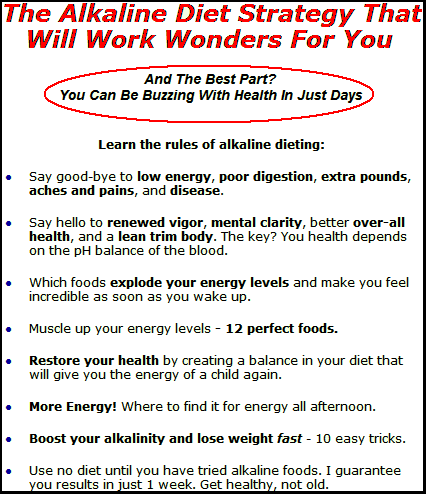
Typical Alkaline diet claims. 5http://acid-alkaline-diet.blogspot.com/2008/02/comprehensive-alkaline-foods-list.html
The alkaline diet is based on the claim that essentially all diseases are caused by an excess of acid in the body. Promoters of this diet claim that certain foods increase acidity in our blood, while others increase alkalinity. According to the Acid Alkaline Association:
“Foods are classified as acid-forming or alkalizing depending on the effect they have on the body. Acid-forming diets lead to acid indigestion that eventually creates a condition known as chronic acidosis which acidifies body tissue.”
“This leads to all sorts of diseases such as cancer, heart disease, stroke, memory loss, nutrient deficiencies and poor athletic performance. All of these conditions are, for the most part, due to acid-forming diets that violate the acid/alkaline blood ratios of your body cells.” 6http://www.acidalkalinediet.net/
Among the many diseases that alkaline diet proponents attribute to an “overly acidic diet” is Inflammatory Bowel Disease (Crohn’s disease and Ulcerative Colitis). 7https://davidkleinphd.wordpress.com/2013/08/09/animal-meats-and-inflammatory-bowel-disease/ 8http://conquercrohns.blogspot.com/ 9http://diet.lovetoknow.com/wiki/Alkaline_Diet_Crohns_Disease To some patients, it may seem intuitive to associate “acidic” foods with a defining characteristic of their disease – inflammation. Acid can burn, right? So, doesn’t it make sense that acidic foods could lead to an Inflammatory Bowel Disease?
If only it were that simple.
Promoters of Alkaline diets are counting on people to believe them because of their ideas seeming to make sense, rather than there being actual evidence that they’re correct.

For instance, here is a quote from a company that sells various Alkaline diet-related products and books:
“Blood in the human body has a natural pH of 7.3* which is alkaline, so it would make sense that eating and maintaining an alkaline diet would help your body function at its tip top shape.” 10http://www.ionizeroasis.com/pages/alkaline-diet.html
*Human blood actually has a pH of 7.35-7.45, but we will get to that. 😉
And here is another quote from a different company:
“The alkaline diet JUST MAKES SENSE! Try not to get too caught up in the science of it all.” 11http://liveenergized.com/alkaline-diet-scientific-proof/alkaline-diet-proof/
It’s important that we, as patients, don’t simply believe what seems to “make sense” when it comes to making decisions about our health. All the more so when claims being made go against well established scientific and medical knowledge, as you will see is the case with the Alkaline diet. While knowledge is empowering, misinformation can be dangerous to a patient’s health.
Because this is a brief overview, we’re going to get right down to brass tacks. While the premise of the Alkaline diet is suspect at best, its proponents still insist it is based on science. 12http://liveenergized.com/alkaline-diet-scientific-proof/alkaline-diet-proof/ But, is it?
Is the Alkaline diet based on science?
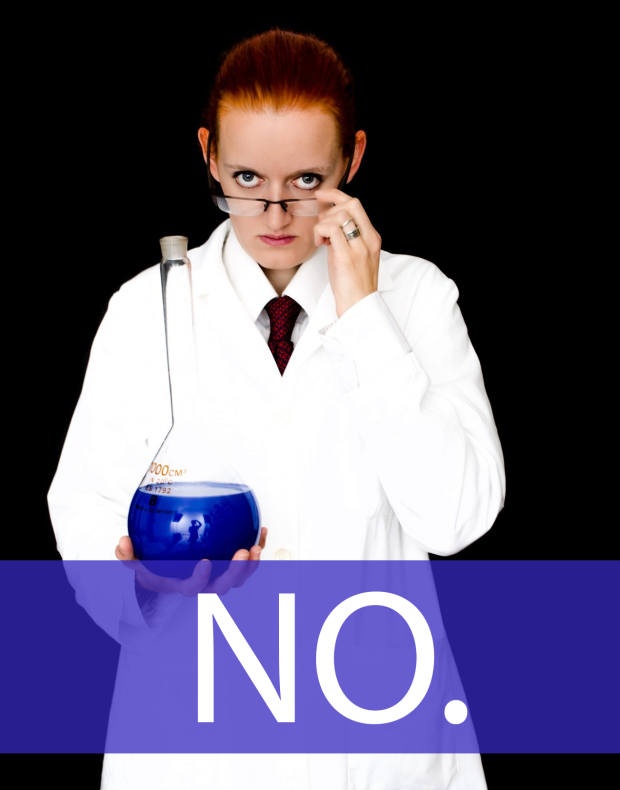
No. The Alkaline diet is a type of pseudoscience.
According to the Merriam-Webster dictionary, pseudoscience is “a system of theories, assumptions, and methods erroneously regarded as scientific”. 13https://www.merriam-webster.com/dictionary/pseudoscience An underlying feature of medical pseudoscience is that claims are presented in a way that’s designed to appear scientific (such as by using scientific terms) despite lacking supporting evidence or other scientific backing.
When asked about the Alkaline diets, the nutrition experts at the Dana-Farber Cancer Institute explained that they “lack what we refer to as biologic plausibility. In other words, given the medical community’s understanding of how the body works, these diets don’t make sense.” 14http://www.dana-farber.org/Health-Library/Diets-Promoted-in-the-Media.aspx
Promoters of the Alkaline diet may use scientific words and ideas, such as blood pH and acidosis, but they use them incorrectly, deceptively, or in the wrong context. And, despite lacking biologic plausibility, alkaline diet proponents will try to present their claims as being based on science. When the foundation of an idea, or a diet in this case, is based on an incorrect understanding of science, any conclusions made beyond that should not be taken seriously.
According to Stephanie Vangsness, M.S., R.D., L.D.N., senior clinical nutritionist at Dana-Farber Cancer Institute and Brigham and Women’s Hospital:
“Advocates of alkaline diets claim that they help you lose weight, increase your energy, and even reduce your risk of heart disease and cancer. While their arguments sound persuasive, they ignore all the facts.” 15http://web.archive.org/web/20141111182704/http://www.intelihealth.com/article/alkaline-diets-and-cancer-fact-or-fiction?
So, according to scientists who specialize in nutrition and diet, such as Ms. Vangsness, alkaline diets are not based on science, however much their ideas may seem to make sense. They “ignore all the facts”.
Let’s take a look at some of the facts ourselves, starting with the meaning of the terms “acidic” and “alkaline”.
What does it mean to be acidic or alkaline?
For the sake of this article, we’re just going to define the terms we need to know in the simplest way possible.
Acidic solutions have a pH below 7.
Alkaline solutions have a pH above 7. Another term for alkaline is “basic”.
Neutral solutions have a pH of 7.
pH is said to stand for either “power of hydrogen” or “potential hydrogen”. 16http://medical-dictionary.thefreedictionary.com/Potential+of+hydrogen It’s a measure of the hydrogen ion concentration of a solution. Solutions with a high concentration of hydrogen ions have a low pH and are considered acidic, while solutions with a low concentration of hydrogen ions have a high pH and are considered alkaline or basic. “Neutral” is a reference point based on pure water – it is considered neither acidic or alkaline. 17http://academic.brooklyn.cuny.edu/biology/bio4fv/page/ph_def.htm
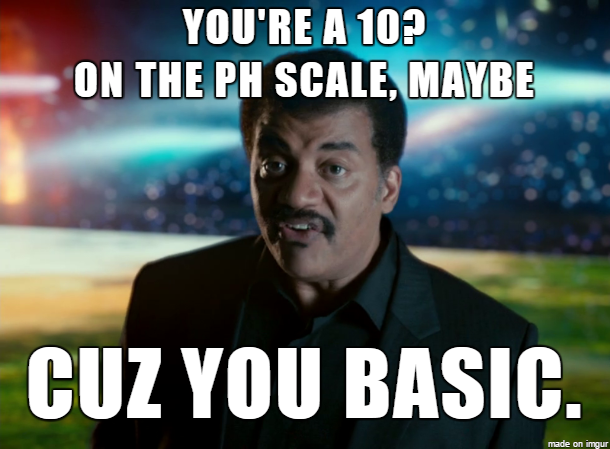
Ohhh, burn! Sometimes bases can burn too! Get it? (Joking aside – it’s true! Strong bases can be very corrosive and cause burns).
Each increase of pH by 1 actually represents a ten-fold decrease in Hydrogen ion concentration. Likewise, each decrease of pH by 1 represents a ten-fold increase in Hydrogen ion concentration. 18http://academic.brooklyn.cuny.edu/biology/bio4fv/page/ph_def.htm So, for example, a solution with a pH of 6 (an acidic solution) has 10,000 times the concentration of hydrogen ions as a solution with a pH of 10 (an alkaline/basic solution).
An important point here is that small differences in the pH value of a solution actually represent significant changes. If our blood were to be outside of a healthy pH range in either direction, even by a difference as small as .1 pH, it could lead to serious effects on our health.
Part of the premise of the Alkaline diet is that the food we eat causes “acidosis”, or blood that is too acidic – a major concern, if true. But, can we really cause acidosis with the food we eat?
What is acidosis, and how does it relate to the food we eat?
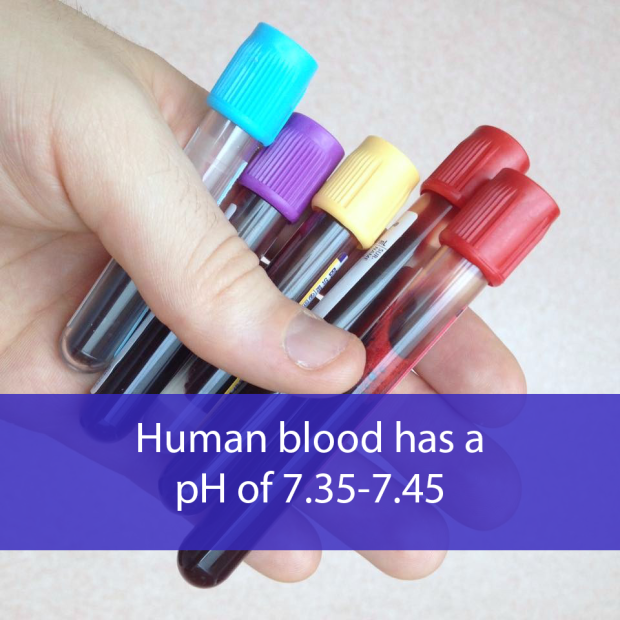
Our blood’s pH value is normally between 7.35 and 7.45 19http://www.merckmanuals.com/home/hormonal-and-metabolic-disorders/acid-base-balance/overview-of-acid-base-balance, which is slightly alkaline. It is very important for our blood to remain in this range. Having blood that is either too acidic (“acidosis”) 20http://www.merckmanuals.com/home/hormonal-and-metabolic-disorders/acid-base-balance/acidosis or too alkaline (“alkalosis”) 21http://www.merckmanuals.com/home/hormonal-and-metabolic-disorders/acid-base-balance/alkalosis is detrimental to our health and can lead to death if not treated.
Worry not, however, because our bodies are very, very good at regulating the pH of our blood – and it does so without us having to think about it. This occurs through a series of processes and mechanisms that are collectively referred to as Acid-Base Homeostasis 22http://journals.cambridge.org/action/displayFulltext?type=6&fid=9016508&jid=BJN&volumeId=110&issueId=07&aid=9016507&bodyId=&membershipNumber=&societyETOCSession=&fulltextType=RV&fileId=S0007114513000962#sec1 or Acid-Base Regulation 23http://www.merckmanuals.com/professional/endocrine-and-metabolic-disorders/acid-base-regulation-and-disorders/acid-base-regulation. In short, our bodies maintain a normal, healthy blood pH through the work of buffers in our blood, our respiratory system, and our kidneys. 24http://www.anaesthesiamcq.com/AcidBaseBook/ab2_1.php
To really appreciate the pseudoscientific nature of alkaline diets, consider the term “acidosis”. The premise of the Alkaline diet is that eating the wrong foods leads to acidosis, which then leads to just about every known disease. 25http://www.acidalkalinediet.net/acidosis-the-kiss-of-death.php As is typical of pseudoscience promoters, they make use of an actual diagnosis (acidosis), but misrepresent it in order to fit their narrative. So, what exactly is acidosis? According to the Merck Manual of Medicine:
“Acidosis is excessive blood acidity caused by an overabundance of acid in the blood or a loss of bicarbonate from the blood (metabolic acidosis), or by a buildup of carbon dioxide in the blood that results from poor lung function or slow breathing (respiratory acidosis).” 26http://www.merckmanuals.com/home/hormonal-and-metabolic-disorders/acid-base-balance/acidosis
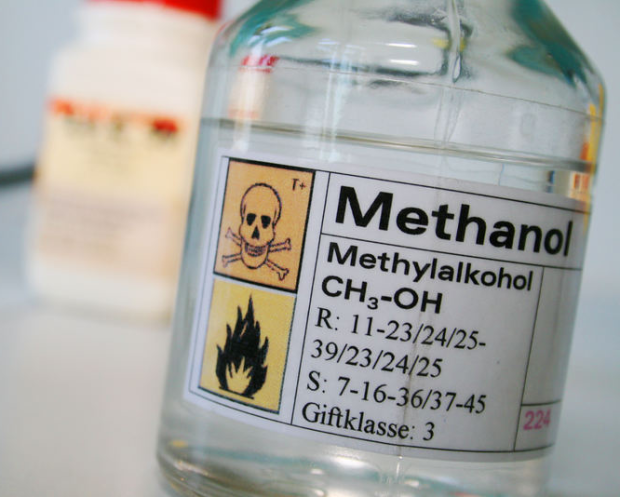
Methanol – the original acidifying diet. Seriously, though… DO NOT CONSUME!!! You will go blind and then die.
Acidosis is a serious condition that can lead to coma and death if not treated properly and promptly. However, the possible causes of acidosis do not include our diet – unless you are ingesting methanol, or some other non-food substance that is or can be metabolized into an acid (I believe the skull-and-crossbones on a bottle of Methanol is sufficient for most people to know it’s not food 😉 ). 27http://www.merckmanuals.com/home/hormonal-and-metabolic-disorders/acid-base-balance/acidosis The treatment for acidosis also does not involve our diet. A patient with acidosis must be evaluated and treated by a physician. 28http://www.merckmanuals.com/home/hormonal-and-metabolic-disorders/acid-base-balance/acidosis
In short, unless you have a condition that interferes with normal Acid-Base Homeostasis, you do not need to worry about the pH of your blood.
While the Alkaline diet claim that “acidic” foods lead to acidosis, which then causes IBD, is baseless (another alkaline pun! 😆 ), proponents still insist that the food we eat has an effect on the pH of our blood. Short of causing acidosis, is there any evidence to this claim?
Does the food we eat change the pH of our blood?

No. The food we eat does not change the pH of our blood.
As was covered earlier, the premise of alkaline diets is based on a faulty understanding of science. But, it’s not just that it doesn’t make sense on paper. The claim that the food we eat alters our blood pH has been put to the test… and it failed.
The Geneva University Hospitals and Faculty of Medicine published a review article in 2013 titled “Nutritional disturbance in acid–base balance and osteoporosis: a hypothesis that disregards the essential homeostatic role of the kidney”. It provides an overview of the research relevant to the misconceptions surround the food we eat and the effect it has on the human body’s acid-base balance. As part of the authors’ analysis, they looked at relevant studies and literature going back over half a century, and found that: “Variations in human diets across a plausible range of intakes have been shown to have no effect on blood pH.” 29http://journals.cambridge.org/action/displayFulltext?type=6&fid=9016508&jid=BJN&volumeId=110&issueId=07&aid=9016507&bodyId=&membershipNumber=&societyETOCSession=&fulltextType=RV&fileId=S0007114513000962 They go on to say that “advocating the consumption of alkalinising foods or supplements […] is not justified by the evidence accumulated over the last several decades.” 30http://journals.cambridge.org/action/displayFulltext?type=6&fid=9016508&jid=BJN&volumeId=110&issueId=07&aid=9016507&bodyId=&membershipNumber=&societyETOCSession=&fulltextType=RV&fileId=S0007114513000962
So, not only are we not all suffering from “acidosis”, meaning it could not be the cause of our Inflammatory Bowel Disease, we are not even affecting our blood pH with the food we eat.
But, we’re not done yet! An additional claim that Alkaline diet promoters make is that testing the pH of your urine will indicate the pH of your blood. While this is not going to fool anyone that’s read this far, feel free to read on to see just how misinformed and/or deceitful Alkaline diet proponents can be.
Can our urine tell us the pH of our blood?
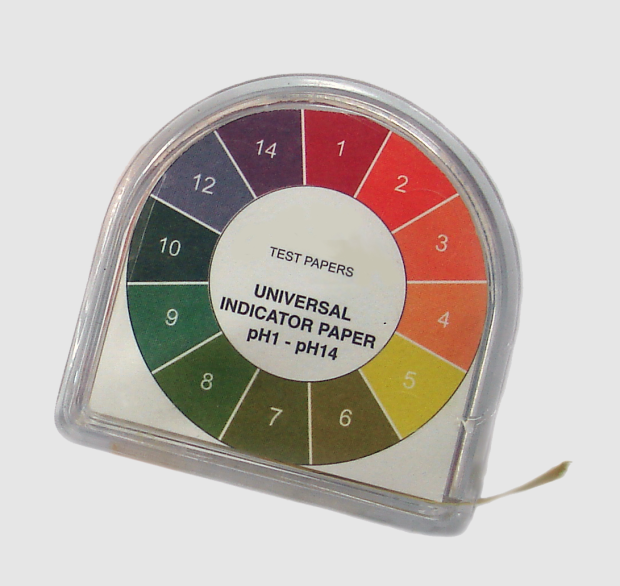
pH indicator paper. Peeing on it won’t tell you what your blood pH is.
Alkaline diet proponents claim that acidic blood is the cause of disease, and one can measure just how acidic one’s body has become by measuring the pH of their urine 31http://www.acidalkalinediet.net/acidosis-and-cancer.php. The glaring problem in this claim is that our urine pH is not the same as our blood pH. In fact, they don’t even correlate with each other 32http://journals.cambridge.org/action/displayFulltext?type=6&fid=9016508&jid=BJN&volumeId=110&issueId=07&aid=9016507&bodyId=&membershipNumber=&societyETOCSession=&fulltextType=RV&fileId=S0007114513000962. You can not use the pH of your urine to determine what the pH of your blood might be.
Here is a nice overview by Oliver Wales, science writer for the Cancer Research UK foundation: “Blood is usually slightly alkaline. […] It can’t be changed for any meaningful amount of time by what you eat, and any extra acid or alkali is simply peed out in urine. To maintain the correct balance within the body, your urine can and does change pH, depending on what you’ve eaten. This can be seen by testing urine pH (acidity) after eating different foods and is the basis of the mistaken belief that diet can ‘make the body alkaline’. But that’s all you’re changing, and anyone who claims otherwise simply doesn’t understand how the body works.” 33http://scienceblog.cancerresearchuk.org/2014/03/24/dont-believe-the-hype-10-persistent-cancer-myths-debunked/#acidic-diets
Now that we have covered the major claims of Alkaline diet promoters, let’s look a little more at how this all relates to IBD patients.
A patient told me the alkaline diet made them feel better. Why is that?
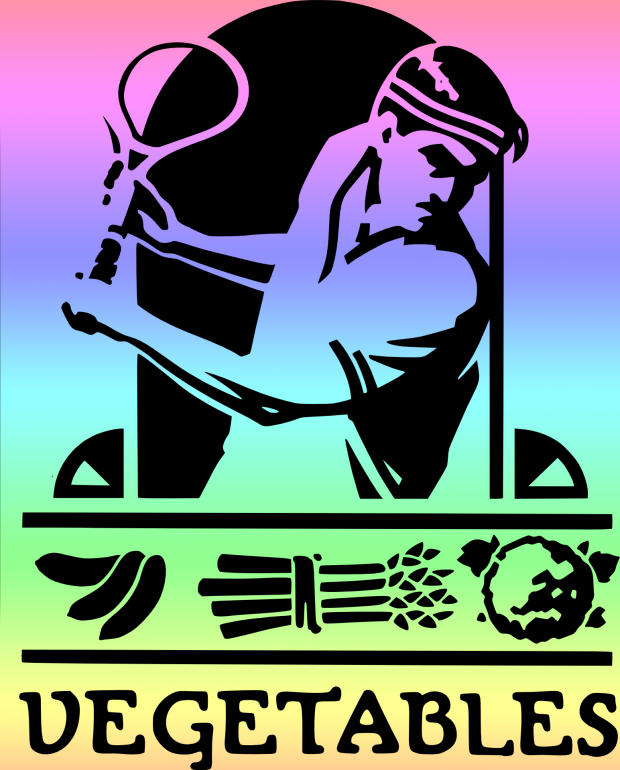
Vegetables, yeah!
Some patients may report feeling better while following an alkaline diet. What is potentially healthful about the alkaline diet is that it promotes a lot of fruit and vegetables. For some people, this may be an improvement over what they had been eating. The increase in fruits and vegetables may potentially improve their nutritional status, assuming they are still getting enough calories with their new food choices. 34http://medical-dictionary.thefreedictionary.com/nutritional+status 35http://www.medscape.com/viewarticle/707278_3 It’s also possible that the “alkaline” foods the patient has decided to eat happen to be less gas-forming, or affect their microbiome in some positive way, leading to less discomfort 36http://www.ncbi.nlm.nih.gov/pmc/articles/PMC4155344/. There are a lot of reasons why any particular food may or may not contribute to or help decrease symptoms in a patient. Not to mention, it could come down to: coincidence, placebo effect, or a failure to attribute decreased symptoms to the medical treatments a patient is taking for their IBD.
However, the reason the diet may be healthy or helpful for some people is not what its proponents claim. And if you’re making decisions about your health based on a false premise, you may ultimately suffer for it.
First of all, a major risk here is that a patient may neglect their health in other ways because they are putting too much faith into a diet that is based on a lie. If a patient feels better in some way after starting the Alkaline diet, they may feel justified in believing all of the faulty claims made by Alkaline diet promoters. It is commonly claimed by alkaline diet proponents that the diet alone can treat or even cure Inflammatory Bowel Disease, as well as an exhausting number of other diseases 37http://www.acidalkalinediet.net/acidosis-and-cancer.php. If a patient truly believes the alkaline diet claims, they may make the potentially tragic decision to stop taking the medications that are actually treating their disease. Sadly, there are some well-publicized cases of this happening with cancer patients. 38https://www.sciencebasedmedicine.org/ph-miracle-living-dr-robert-o-young-finally-arrested-but-will-it-stop-him/
Second, because the alkaline diet excludes a large number of foods for unscientific reasons, it can just as easily lead to poor dietary choices as it can lead to positive ones.
As Stephanie Vangsness, Registered Dietitian, puts it:
“Alkaline diets promote the exclusion of many foods. Excluding an entire family of foods can result in some vitamin and mineral deficiencies. You may also miss out on some potential anti-cancer benefits.” 39http://web.archive.org/web/20141111182704/http://www.intelihealth.com/article/alkaline-diets-and-cancer-fact-or-fiction?
To illustrate, here are some examples of foods considered “acidic” according to Alkaline diet proponents: Salmon, nuts, peanuts, cranberries, chicken, pickles, pasta, beef, lamb, chocolate, sweet potatoes, most grains, beans, cheese, and coffee. 40http://www.steamerbean.com/the-alkaline-diet/ 41http://foodandnonsense.com/diet-review-alkaline-diet/ Coffee???

Coffee??? Now you’ve gone TOO far, Alkaline diet!!!
This is but a small list of some of the foods Alkaline diet proponents may label as “acidic”. For many patients, these are foods they rely on for sustenance.
This is a very important point to consider. Because, for all of the diet plans out there being marketed to IBD patients with questionable claims, there is one thing about food and IBD that is indisputable: nutrition is of the utmost importance to IBD patients. However, nutrition and diet are not the same thing.
What is the difference between nutrition and diet?
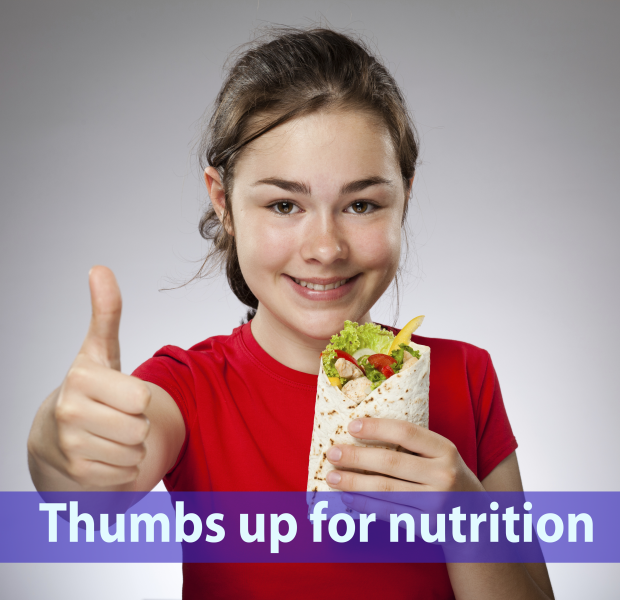
Nutrition refers to “the act or process of nourishing or being nourished”. 42http://www.merriam-webster.com/dictionary/nutrition It means getting appropriate amount of proteins, fats, carbohydrates, vitamins, minerals, and water. 43http://www.merckmanuals.com/home/disorders-of-nutrition/overview-of-nutrition/overview-of-nutrition Diet refers to the specific foods one chooses to achieve proper nutrition. 44http://www.merriam-webster.com/dictionary/diet As I’ve heard one IBD physician explain it, nutrition is what we need, and diet is how we choose to get it. 45Dr. David Rubin – Paraphrased from talk at University of Chicago IBD Education event, October 2014
It’s extremely important that IBD patients receive adequate nutrition for sustenance, recovery from active disease, the prevention of complications, better treatment outcomes, and a higher quality of life. 46http://www.ncbi.nlm.nih.gov/pmc/articles/PMC2678578/ 47http://www.medscape.com/viewarticle/707278_3 48http://www.ncbi.nlm.nih.gov/pmc/articles/PMC2691486/ Some IBD patients can not tolerate certain foods, some patients experience symptoms no matter what they eat, and some patients can eat anything without issue. So, how each patient gets their nutrition will vary.
A major issue can arise with diet plans that put unfounded fear into patients about food types or food groups – those foods may be the one thing a patients feels they can tolerate when they are struggling to get adequate nutrition. And, if you look around online, there is no shortage of questionable or downright harmful dietary advice being given to IBD patients.
A 2014 article, “Diet and Inflammatory Bowel Disease”, from the journal Clinical Gastroenterology and Hepatology, included an analysis of patient-targeted dietary advice. It describes some of the potential risk patients take in following unqualified medical and dietary advice found on the internet:
“Our Web search analysis demonstrated that patient-targeted dietary recommendations are highly restrictive and frequently conflicting. These recommendations may result in patient confusion and unnecessarily restrictive diets in patients who are already at risk for nutritional deficiencies.”
“At a practical level, adherence to defined diets may result in an unnecessary financial burden or reduction in overall caloric intake in patients who are already at risk for protein–calorie malnutrition.” 49http://www.medscape.com/viewarticle/840847_3
It’s important that patients discuss concerns about their diet with a licensed nutritionist, such as a Registered Dietitian, in addition to their IBD specialist. Between the two, a patient should be able to address any concerns or issues regarding food tolerance and nutritional deficiencies.
Let’s imagine, though, that a patient is acquiring adequate nutrition while following the Alkaline diet. Not only that, but they are also experiencing fewer or no symptoms at all. This does not mean that the Alkaline diet is treating their Inflammatory Bowel Disease. Because symptom management is not the same thing as disease management.
What is the difference between symptom management and disease management?
Symptom management refers to controlling the symptoms that are perceived by the patient, such as cramping, bloating, diarrhea, and so forth. Disease management refers to the objective monitoring and treatment of the destructive inflammation underlying IBD. 50http://www.sciencedirect.com/science/article/pii/S1873994614000907 51http://www.inflamed-and-untamed.com/post/36604273987/stable-sustained-remission-in-inflammatory-bowel
A good physician that specializes in the treatment of IBD will want to help you manage your symptoms while also managing/treating your disease.
A peculiar thing about IBD, though, is that a patient’s symptoms and disease state often do not correlate. 52http://www.gastro.org/news_items/2015/2/9/endoscopy-should-be-an-endpoint-for-crohn-s-disease Sara Ringer of Inflamed and Untamed explains it well:
“Did you know that it is possible for you to be feeling just fine, be symptom free, and yet have active inflammation? While it may be great that you are feeling well, it doesn’t always mean that things are okay. This is why it is very important for you to visit your doctor regularly even if you are feeling well and consider yourself to be ‘in remission’ because there still could be active disease. It is also important that you don’t stop taking your medications even if you feel fine unless your doctor tells you it is okay to do so. “ 53http://www.inflamed-and-untamed.com/post/97857262622/no-symptoms-does-not-always-mean-remission-the
To put it another way, you could feel like this:

Feeling great! Symptom-free!
Even if your insides look like this:
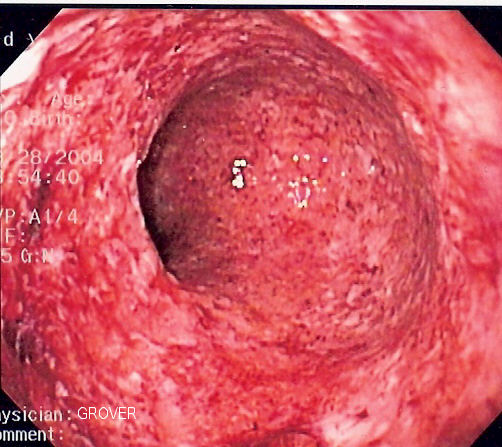
Endoscopic image of severe Crohn’s colitis (Crohn’s disease in the colon) – clearly doing damage! 54https://commons.wikimedia.org/wiki/File:CD_colitis_2.jpg Some patients may not experience obvious symptoms, despite active disease like this.
While both symptom management and disease management are very important when considering the quality of life of a patient, without proper disease management, IBD patients face increased risks of surgery, complications, and even cancer. 55http://www.ncbi.nlm.nih.gov/pubmed/19596953 56http://www.uptodate.com/contents/colorectal-cancer-surveillance-in-inflammatory-bowel-disease 57http://www.nejm.org/doi/full/10.1056/NEJMra1403718
Doctors and researchers are still very interested in diet and IBD. In the future, diet may play a much bigger role in the treatment/management of IBD. In the mean time, it’s important to remember that no diet has been proven to treat inflammation in IBD. 58http://www.medscape.com/viewarticle/707278_7 59http://www.inflamed-and-untamed.com/post/112606127918/recap-dr-higgins-answered-your-questions-on 60http://www.med.umich.edu/ibd/education/diet.html
As Dr. David Rubin of the University of Chicago Medicine IBD Center explains:
“[…]while we’re looking for the cure, we shouldn’t ignore the fact that you should still have your condition treated and under control. We can do that now better than ever before, and that those who continue to believe […] that if they just change their diet they’re going to get better, are unfortunately in denial and also likely to suffer consequences of that strategy.” 61http://sciencelife.uchospitals.edu/2015/03/06/why-havent-we-cured-inflammatory-bowel-disease/
In conclusion:
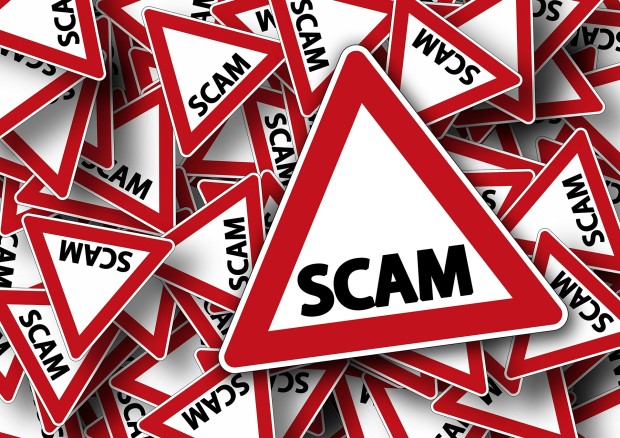
Alkaline diets are a scam.
The next time you come across someone trying to get you to buy their alkaline diet book with claims like: “When the body is too acidic from acid-forming foods, it will not be able to heal IBD until detoxification has occurred.” (Yes, that’s an actual quote. And, the guy who said it will answer your questions through email for $100/hour. But, that’s only after you’ve bought his first book for $23.95.) 62https://davidkleinphd.wordpress.com/2013/08/09/animal-meats-and-inflammatory-bowel-disease/ you will know that:
- The person telling you that is either misinformed or lying, because…
- The Alkaline diet is based on pseudoscience, and promoters can not provide evidence for their claims.
References



